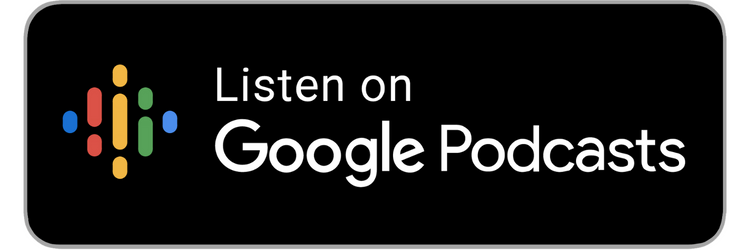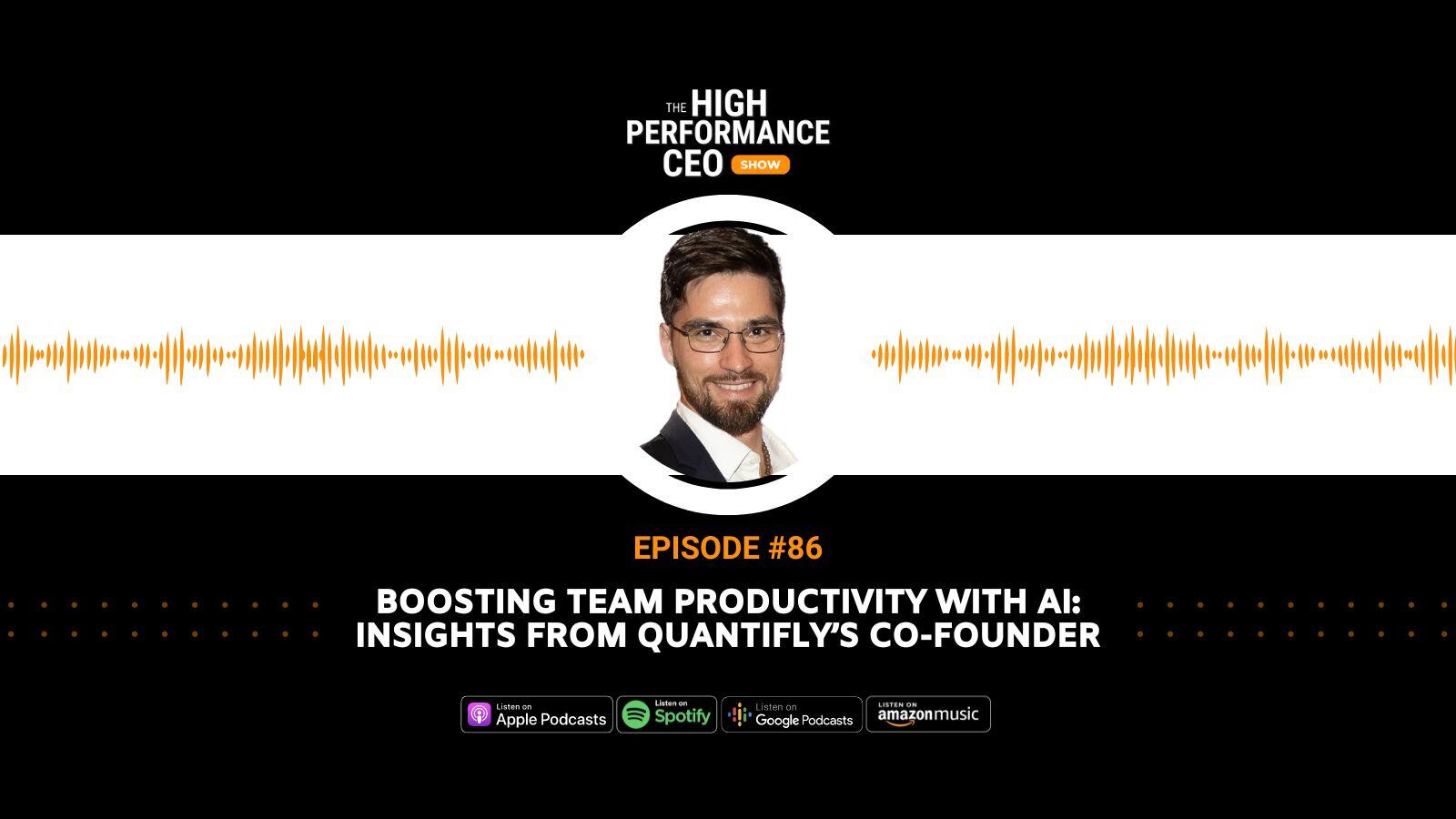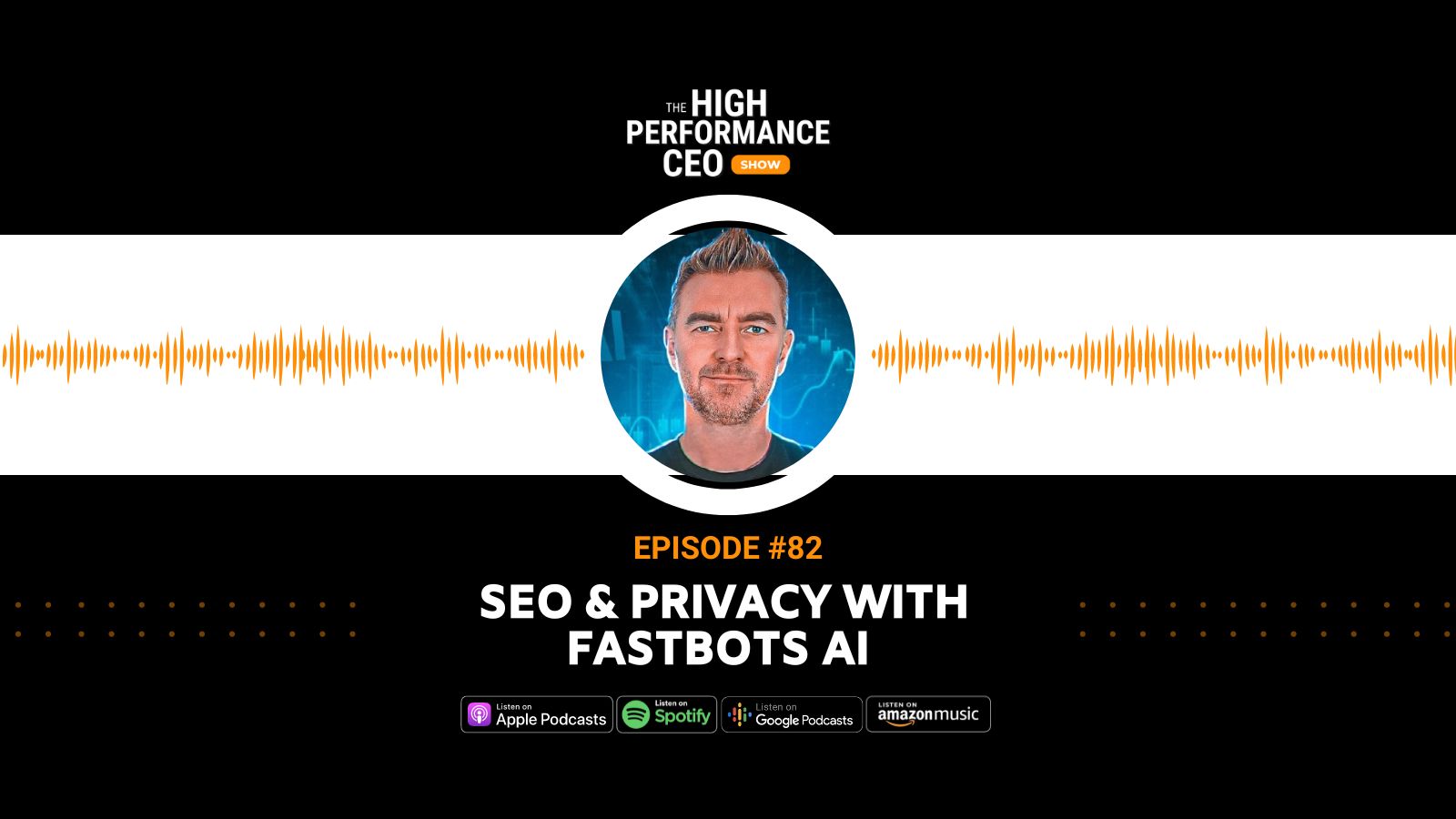.webp)
Episode Summary:
Alexander De Ridder reveals how AI agents can reshape business environments. Diving into AI integration, the episode talks about boosting strategy with AI, customizing for great user experiences, and encouraging innovation within your company. This is a handy guide for CEOs who want to leverage AI for optimized operations and a competitive edge.
About Alexander De Ridder:
- Innovative Technologist: Led the way in creating Ink for All, an AI-powered platform that enhances content creation and marketing strategies.
- AI Visionary: Centered on using AI tech, like AI agents, to automate tasks, boost efficiency, and tailor customer experiences in different industries.
- Strategic Leader: Showcased skills in integrating AI into business operations to boost growth, innovation, and operational excellence.
Key Takeaways:
- Strategic AI Integration: AI can help scale your business operations in innovative ways.
- Customization and Personalization: Customizing experiences and operations with precise AI strategies.
- Competitive Advantage: Staying ahead by leveraging AI's operational efficiency and engagement strategies.
- Innovation and Productivity: Shifting human creativity to tackle more complicated tasks with the help of AI.
- Navigating the Future of Work: Moving into positions that enhance AI technology and require new skill sets.
What the Guest provides
Alexander De Ridder provides key insights into how AI technology intersects with business strategy. He highlights the need for CEOs to embrace AI innovations to stay relevant and lead in their industries.
Why It's Important for CEOs
For CEOs, bringing AI on board isn’t just an upgrade; it's a key move to future-proof business operations, boost customer satisfaction, and fuel remarkable growth. The power of AI to personalize on a large scale and automate intelligently sets a major competitive edge in the current market landscape.
Action Items for CEOs
- Evaluate how ready your business is for AI now.
- Encourage your team's AI and tech skills.
- Cultivate a culture that's all about innovation.
- Come up with a strategy to integrate AI in key areas.
- Stay updated on AI progress to fine-tune your strategies.
Conclusion
This interview with Alexander De Ridder gives an overview on how AI could reshape how businesses work and connect with customers. For CEOs, this is a guide to steer through AI integration, pointing out key strategies, insights, and steps to unleash AI's power for lasting competitive edge and innovation.
Chapters:
- Introduction to AI's Impact: 00:01.39 - Alexander De Ridder's background and how AI can transform things.
- Evolution of AI Technology: 00:50.994 - Shift from marketing tech to machine learning and the start of Ink for All.
- Getting into GPT Innovations: 02:56.786 - How GPT models are changing SaaS use and the birth of SmythOS.
- Breaking Down AI Ideas: 04:47.054 - Simple explanation of function calling and LLMs.
- AI and Working with Humans: 07:20.238 - How AI and human smarts work together.
- Dealing with AI Worries: 08:31.04 - Balancing AI growth with ethics and society.
- AI's Economic Impact: 10:14.56 - How AI could boost GDP and reshape economies.
- Changing Business Processes: 17:55.754 - Using SmythOS to automate and improve business tasks.
- AI's Future in Markets: 29:23.232 - Thoughts on AI in daily life and business.
- Human Role in the AI Era: 38:26.048 - Why human oversight and creativity matter with AI tech.
Read the full transcript here
-
Transcript
Sebastian Schieke (00:01.39)
Hey, Alexander Derrida, welcome to the show.
Alexander De Ridder (00:05.184)
Thanks for having me.
Sebastian Schieke (00:07.63)
Yeah, Speedo, I mean, we talked for a while with your agent to find a booking slot and now I'm really happy to be able to have this conversation with you. You're running a very interesting organization. You're a co -founder and CTO of Smith OS, which is an AI company building the operating system for enterprises. So we would love to hear about this, of course. But before we start, maybe you can give the audience a little bit of a...
rave about your story, your past experience before you went into AI. And yeah, just share a little bit your development path.
Alexander De Ridder (00:50.994)
All right, so I have a computer science background, started out working for marketing companies, developing marketing technology for the web, then went on.
to work as an independent contractor. 2008, I had the chance to start working with machine learning full time. I ran a team of AI researchers, did a lot of work in machine learning and computer vision. By 2012, I saw neural networks come around. I knew that this was going to be something Google would pick up on with their search engine to better qualify.
content. And so we started working on semantic embedding technology in 2013, 14, 15. By 2015, started an agency. 2016 started another agency. Since then, have exited from both of those companies. We bootstrapped those two very large companies. And then beyond that,
We have the story of Ink for All. Ink for All was our attempt to put the technology that we had gained and deployed in enterprise for search engine optimization into the hands of consumers. It's been a popular product since 2019. And.
When GPT came out, we realized, chat GPT that is, we realized that the market was going to change, that consumers were looking for other ways to interact with AI. And last year in March, when GPT -4 came out, we immediately saw the opportunity behind function calling in AI models. And function calling is like humans discovering how to use tools. It makes a big difference. Ever since then,
Alexander De Ridder (02:56.786)
Then we were one of the first 40 approved plugins by OpenAI in their plugin store. And we saw usage adoption for our SaaS that eclipsed anything that had come before it in the years before. And that's when we knew that.
The web was going to change forever. Content marketing was going to change forever. The way we automated business processes were going to change forever. At that time, we had to overcome many obstacles building our APIs, building our agents, securing it, authentication, all of that. And we figured since this was going to be such a monumental shift in the years to come, that there was a real need for a better way to create and build LLM applications.
basically orchestrating intelligence. And that's how we built SmithOS, Smith with a Y. And it's a builder for AI applications, drag and drop, visual, no code. It integrates with any data, API, AI model. It's multimodal, so it can work with text, image, video, audio. It can integrate in any data source, drag and drop your components. It can work with your workflow. You fully control it.
control the inputs and outputs of it. It has a powerful debugger and one -click deployment, security, all of that. So.
Sebastian Schieke (04:24.302)
OK, so we covered a lot of crowd. And I get everything you say, but I bet with you that many people, they don't know what an API is. They don't know what function calling is. Maybe if we step a little bit back and see this a bit of a broader view. So.
Alexander De Ridder (04:34.848)
Okay? Okay.
Sebastian Schieke (04:47.054)
function calling, LLMs, APS. Maybe you can explain this to me as if I would be 10 years old.
Alexander De Ridder (04:50.208)
Mm -hmm.
Alexander De Ridder (04:57.952)
Yeah, no problem. So if I took your brain and I put it in a jar and there's an input cable and an output cable, then that's what most people think chat GPT is. You give it some text prompt and you get a response back. And that's kind of it. But a brain in a jar, I can't do anything in the real world. It cannot open your door when somebody rings the doorbell. It can't mow your grass. It cannot send, you know, it cannot take action inside of other programs or in the digital or in the real world.
Sebastian Schieke (05:22.382)
Exactly.
Alexander De Ridder (05:27.858)
real world, function calling basically means that you give that brain energy arms and limbs and can move around the digital and real world space. And the innovation is that it can, it basically grows a nervous system where that brain can control those limbs. And that is a big revolution. Now with humans, we know that if you were to take a smart human, but strip them from clothing and tools and put them into Amazon for
forest, their survival rate is not going to be very high. Without tools, without a bow, without clothing, without way to make fire, protection from the elements, you're not going to survive very long. So tool usage is essential for creating real value in this world. But more than that, you also derive a lot of value not just from tool usage, but also from collaboration. So now we're at a state where AI
AI has clothing, knows how to use tools, and basically the tools it can use is the entire internet, but also all robotics devices. And in addition to that, AI now also knows how to collaborate with other AI colleagues. So collaboration and tool use are combined.
essential for creating civilization. Once again, a human with tools in the Amazon forest will not create civilization. You will never create a computer. You will never put a person on the moon, but put a whole city together of people collaborating, innovating, making progress. And all of a sudden you see magical things happen. And so we're basically seeing AI grow up from, you know, from baby to adulthood before our eyes.
Sebastian Schieke (07:20.238)
Thanks. I think that's a much clearer explanation to give some context.
Sebastian Schieke (07:30.126)
There's a lot of, I mean, there are two types of people, you know. There's the one side who, they're really enthusiastic about AI, they say, hey, this is changing everything. And there's one side who they're very reluctant, concerned, and they think AI is there to replace us and there's nothing left to do and eventually will take over the world and it will destroy everything and so on.
We both know that's not the case, but what can we say to the people who are still very concerned about AI and also listening to you, I mean, you connecting basically AI to all kinds of applications and creating an ecosystem. What's the impact on us humans?
Alexander De Ridder (08:31.04)
So the future is in our hands. We determine what kind of future we want.
You know, there was a time in the industrial revolution where we had factories, all of a sudden people left the farmland and started working in factories. And, you know, before long, it was very obvious that the working conditions in those factories were not very humane and they were not very positive. So people gathered together and they demanded change and they influenced that change. And now there's a lot of protections
for such workers who work in factories. So likewise, when it comes to this new industrial revolution, it's an industrial revolution of intelligence, an explosion of intelligence.
When it comes to this, humans need to organize and let their voices be heard to basically where democracy needs to serve the people. And that means making sure that artificial intelligence works for us, not against us. Now, the change of AI itself is, it is somewhat inevitable.
Just like the United States could not stop the development of nuclear weapons in the past for geopolitical reasons, AI also was a similar type of technology. No country wants to fall behind. No company wants to fall behind. And so everyone is just like stumbling along towards this path of progress. And so that part is happening.
Alexander De Ridder (10:14.56)
but how we use it to benefit humanity, that is up to us, not up to others. And so the...
The way I see the future, and I've mentioned this a few times, but here's a framework for how I see that happening. Currently, you look at the wealth of a country as expressed as gross domestic product or GDP per capita. That means economic output of productivity per average citizen. The more economic productivity per citizen, the more wealth a country has to distribute towards taking care of each citizen. The better the social services, the better the general
welfare of the public, economically speaking at least.
So when you're looking at the GDP of different countries, you see the rise of China coincided with a large population increase. A large population increase increased the number of workers, knowledge workers and physical workers. That resulted in massive wealth creation. So once you have created that wealth, there's a point at which you cannot export it anymore, then you need to start benefiting that wealth or sort of internal market or internal
consumption. So this, for example, the United States, the surface economy is really strong. So what we're seeing with AI agents and AI technologies is we're basically, you can imagine, what would the world be if there were 800 billion people?
Alexander De Ridder (11:47.648)
100 times more. If those AI agents were able to perform at human level, which we understand the trajectory is that they could perhaps perform at superhuman level in the future, but assume that they work at human level, you can understand that the GDP per capita, and capita being humans now for a country, can increase 100 -fold. And so if we have 100 -fold wealth per capita,
per person, then the society should be able to take care of people's needs 100 fold as well. And so there is an economy currently and since ancient times, where people trade with people, right, people buy from people. But now we are in an economy.
especially since Web 2 .0 in the early 2000s, where people are also buying from computers. We go to an e -commerce store or we buy from a website instead of from a human directly. And sometimes we buy digital products which are entirely made by computer programs. SaaS companies are very popular as an investment vehicle for VCs for that reason. So what we're going to see in this new economy is that AI agencies,
are going to also start conducting transactions with other AI agents. These will be micro transactions that will likely happen over government sanctioned blockchains, and they will have trillions of transactions per day. I believe that there will be at least a thousand times more transactions between AI agents happening at any given moment than transactions involving humans. So what is happening now is, and if you need an example,
And the best example of that is, let's say, an article writing agent needs to call upon an image generation agent for help. And it pays a microtransaction to that agent to get that result back and then use that for economic productivity. So agents ask other agents for help. And so I believe that.
Sebastian Schieke (13:57.036)
Mm -hmm.
Alexander De Ridder (14:01.92)
Since these transactions will be 1 ,000 -fold or more, I believe there will be over a trillion transactions a day and a not -too -far future between agents. Because the velocity of those transactions and the volume of those transactions, we see that that...
A hundredfold increase in GPD per capita will basically be not involving human labor, not involving human time, but they will create wealth. So for example, a government or a people could get together and decide, let's add a value added tax on these agent to agent transactions. And then that value added tax can then provide for the services and essential needs of its population and distribute it in a fair,
Sebastian Schieke (14:42.83)
Hmm. Yeah.
Alexander De Ridder (14:52.914)
equitable way. Now, when it comes to providing services today, for example, healthcare, today, that is very expensive. Education is very expensive, because you need to send people, for example, to train to learn to be a doctor for 10 years, and then you need very expensive medical equipment, and so forth, and so on. With the AI revolution, we can expect those costs to come dramatically down.
we could have access to AI doctors who diagnose us. We can have sensors on our body and that monitor us and personalize our health care, prescribe medication, and so forth. Same thing with education. Every kid can have access to the best education in the world via AI tutors that are just VR avatars that you can interact with. Now, so as these cost of essential services dramatically come down, if you look at what the government is
really spending their money on. The population would say, typically I'm okay with getting some taxation as long as the government provides me with infrastructure, protection, education, healthcare, services like that. When the cost is coming down so dramatically for basic services and at the same time, we are increasing the GDP per capita a hundredfold, there is no reason for poverty. There's no reason for anyone to be lacking of anything. Again, this is
is a societal contract we can make. We could even envision the total elimination of the personal income tax because humans who want to make additional economic gain or income from human to human economy would only represent a small percentage of the total economic output of a country. So when you live in such a society when your basic needs are taken care of, when everyone has health care and basic services, what would people do? I believe they would engage in soul craft rather than work.
just to make ends meet or pay the bills.
Alexander De Ridder (16:52.96)
And soulcraft could be things that give real meaning to your life. For example, I often say that it is unjust that we pay receptionists more than mothers, because one job is far more important than the other. There are many jobs and many things that people would love to do if they had more time, but this current economic system simply doesn't allow them to be fully human and fully express themselves. And I believe that this is the type of...
Sebastian Schieke (17:09.91)
Mm.
Alexander De Ridder (17:20.16)
This is the type of future that we can all work towards.
Sebastian Schieke (17:24.27)
For me, it sounds like a very interesting future, a lot of positive sides. And you're building the operating system for agents to communicate with each other, to automate activities. So how, taking a standard mid -sides corporate, how would they implement what you developed? How would they use your operating system? How would they start?
Alexander De Ridder (17:55.754)
Right, so if they have used robotic program automation, RPA, before, then this. Yeah. So larger companies they have and smaller companies, basically everything is a business process, right? Whether you're hiring someone or you're writing some content for a blog, everything is a business process.
Sebastian Schieke (18:03.182)
Or maybe no one knows what an RPA is. Maybe explain this in a bit.
Sebastian Schieke (18:21.942)
Thank you.
Alexander De Ridder (18:22.624)
The more often you do something and the more valuable a certain process is, the more value that you get from augmenting it, automating it. In the past, you could only automate with hard -coded programming language that lacked intelligence. That means that those bots or automations easily broke. So people that build and maintain those are basically bot nannies. It's a very frustrating.
Sebastian Schieke (18:40.238)
Yes.
Alexander De Ridder (18:52.54)
job to do, but there is real economic benefit from automation. Now with the AI revolution, we have the opportunity to replace that whole industry with intelligent agents. You can think of them more like adding digital coworkers to your team. They do not need to go sleep or go on vacation, and you can quickly onboard them on your process with a drag and drop interface in Smith.
Sebastian Schieke (19:18.766)
Okay, and what is a typical automation which is used by your customers?
Alexander De Ridder (19:23.998)
Oh, typical. Right. So one type of automation is sales customer service. Right now people come to your website and what do they need to do? They need to click around until they find the information they need. If they click away, do you know why they left? Do you know what they were looking for? No.
Sebastian Schieke (19:31.116)
Mm -hmm.
Sebastian Schieke (19:43.854)
Yeah, most likely not. Yeah.
Alexander De Ridder (19:45.632)
No. So that needs to change. You need to have a brand agent that represents your brand, that can take the questions, answer the questions, and that you can do an analysis about later on if they left without buying, what were they looking for that I couldn't persuade them or answer? And so this is a totally new frontier for marketing. I believe that this is going to change the SEO and marketing landscapes completely. You can see already that,
Sebastian Schieke (19:47.662)
huge potential.
Alexander De Ridder (20:15.658)
Google's and other search engines are shifting to conversational search. And the essence is that people don't have time to click around 50 websites and links to try and find the answer. We're all busy. We need to move faster for that. So everything. Go ahead.
Sebastian Schieke (20:19.5)
Mm -hmm.
Sebastian Schieke (20:29.422)
Yeah, so you say, mm -hmm. No, sorry, please. Well, OK. So you say that the typical search engine optimization is disappearing in the near future. Yeah.
Alexander De Ridder (20:42.912)
100%. And you can already see it. I mean, what do you think would happen if you give everyone ability to click a button and generate content for their website? How long do you think the old web is going to survive that? Not very long, right? And so you need to focus more on the brand value, the unique trust and reputation you have and customer experience. And the way to do that is by creating conversational brand agents that can tailor the user experience exactly to the brand.
Sebastian Schieke (20:57.646)
Exactly.
Alexander De Ridder (21:12.818)
to what they need. This is the dream of marketing, hyper -personalized marketing, and it is going to change how we interact with customers. Before long, the average customer is going to interact with their AI assistant, their Siri, their Alexa, their Google Assistant, more, their Cortana.
more than they do in a regular web browser because the assistant will be able to create web pages on demand based on its research of the internet. Now brands are going to be able to represent, like let's say you want to book a hotel room, your AI assistant has just brought in Expedia to the room and now you can have a conversation with the Expedia brand agent. Why would the AI assistant do that? Well, because
the Expedia agent has a good reputation just like your website today has a good reputation. It has great content, it is fast, it is enjoyable, it solves people's needs and so the job of search engines is going to basically evolve to be the job of identifying the best brand agents for people and customers to interact with.
advertising money will happen because certain brands are not going to be optimized to be in such conversations with customers for every search intent. And so there's going to be an auction marketplace where you can insert yourself as options in such conversations and so forth. So we have the whole marketing world that's changing. Brand agents will handle customer information, customer support, returns, troubleshooting. You can envision buying an IKEA.
set of furniture and putting your next -gen Apple glasses on and having an IKEA assistant walk you step -by -step on how to assemble it. The brand agent is right there and as you put it in your office you may notice that you missed some RGB lighting to go with it and it may recommend some product that with one
Alexander De Ridder (23:12.288)
With one voice command, you can then check out and will be shipped to your home. And then when it arrives, the brand agent will be ready to integrate it with you again. So that's brand agents. On the other hand, you have companies who have need for scaling. So instead of having 100 content writers, you now have a series of content and marketing agents to help you with it. So one human can collaborate with 10, 20, 30 AI agents.
in a team that continuously output new content, for example. But you can apply this to every problem imaginable. You can apply this, for example, to logistics, to health care, to finance.
And for example, let's say you have a warehouse and you have an e -commerce store you sell material. You could dispatch a drone to go take a picture of your items to see if it's actually in stock and use Vision AI models to analyze it and update the client in real time if that item is really in stock.
So we can envision service businesses to become as profitable as SaaS companies are today with the scalability and profit margins of SaaS companies. That means that legacy service businesses are in for a wild ride. Venture capital will flow into those and totally reinvent how they operate. And SaaS companies will also have a challenge of their own because agents as master tool users are
are able to access all the tools on the internet to combine different things to create new things. So for example, you could ask your personal agent to create something, and it can go and rely on four, five, six, seven, 10, 100 microtransactions with other agents on the web who can provide one step of the puzzle and help you get that done. So if you are a SaaS company that only exists with nothing unique, but you're just compiling.
Alexander De Ridder (25:25.314)
two or three services into one solution, then you're going to have a difficult time remaining relevant. And so with the change of AI models that constantly come out, a lot of SaaS companies will be disrupted. So for such companies, it is important to move at the speed of innovation and be able to adapt quickly, but also to really specialize and become the highest trustworthy agent or SaaS provider for specific problems.
And so with Smith OS, we're also helping such companies survive. They will have to pivot somewhat and start to specialize and really be known in this new economy. But at least with Smith OS, you can orchestrate new AI models, data systems, tools, and workflows at the speed of your imagination.
Sebastian Schieke (26:18.19)
So with Smith OS, I can create my own agents, which are then connecting to whatever agentings out there in the world looking for solutions which I might be able to provide.
Alexander De Ridder (26:30.272)
Right, so we've created, for example, we've created a sales agent assistant. When my sales team has sales meetings, the AI note taker sends the transcript to my agent. My agent processes that, integrates with the calendar and HubSpot, looks at the customer history, looks at the transcript, and creates and designs a new closing strategy, drafts follow -up emails, set tasks, assigns a sauna.
tickets, and so forth. And so the call is over. My salesperson doesn't have to do any work. Just review the output and hit Approve. And then the client can move along in the sales process. When we're trying to do outreach, same story. We can simply provide the identity of the person that we're going to meet with.
The sales agent, account -based marketing agent can do web research about this person, their company, who their audience is, what their likely problem is. Look in the database of knowledge about our product and the company. Find matches on how we can potentially help them. Imagine use cases that we can work on with them. And what it can then do is put a personalized pitch together so that our salesperson only has to hit send on those emails.
We can even create a digital avatar of our salesperson with a personalized video script like, hey, Sebastian, I know you're working on this. It looks like you're trying to solve that, and here's how we can help. And so we can do this now at scale. Same for our content marketing. Same for every department in our company. So at the agencies that I've created before, we still have a great relationship there. We are creating.
agents for every person in the team. So by the end of this year, the entire organization will have 20 to 30 % higher profit margins.
Sebastian Schieke (28:31.406)
How do you see, I mean this is a technology which is obviously not yet used by the broad majority of companies. So it's very niche solution which companies with a strong focus on technology implement. But how do you see this going? What time?
framed you see until this is standard practice, until normal companies without a huge IT department or without the focus on technology are leveraging agents to.
sell their services to help their customers.
Alexander De Ridder (29:23.232)
All right, so there's two answers to this. One is the consumer market, and one is the workspace, the business market. For the consumer market, you already see Microsoft trying to push their co -pilot inside Windows, right? That is just the beginning.
Sebastian Schieke (29:31.086)
Mm -hmm.
Sebastian Schieke (29:39.31)
Mm -hmm.
Alexander De Ridder (29:43.712)
Google Gemini is going to be shoved down your throat through Android devices. The next generation of Siri is going to be foundational to their next version of their iOS. Same thing. Apple is taking a little bit longer time. But when they are going to release their new Mac version, it's going to have a dedicated AI chip silicon that's super optimized for AI models that works extremely fast. And their entire operating system is going to be
intelligent. Organizing your files, finding your files, Spotlight is going to feel like a relic of the past.
It is going to completely change how you interact with your computer and people's minds are going to be blown. Apple's taken a little bit longer, but when they're going to come out with this, everyone's going to just be amazed. So for the consumer market, when these AI systems start being so good that you almost don't need to open your app and apps anymore on your phone, you can just talk to your assistant who can use the apps on your behalf. And so we have large action models as well who are able to browse the web on our behalf.
use the computer on our behalf, use the mobile phone apps on our behalf. And so you can ask it to do anything that you can normally do with an app or anything you can normally do in a browser or a computer.
just with having a conversation. Then you'll have things like dynamic server -side generation. Dynamic server -side generation is the act of AI putting together entire user interfaces on the fly for you based on your exact need. This is going to start really simple, but it's going to evolve all the way to the point where you can imagine a Star Wars episode and it's going to generate a whole game that you can live in exactly, living out the thing you're asking for.
Alexander De Ridder (31:32.334)
including the metaverse. You'll be able to put on your glasses and not just play chess with a chessboard and see the pieces moving, but you'll be able to see your AI companion right in front of you and have a conversation with it. You'll be able to see them sit next to you on the sofa and watch a movie and share thoughts about it or read a book together. And then with humans as well. So when this happens, this is going to happen and start happening this year. You see it start happening with Windows, with
the co -pilot integration, but this is going to become more and more a thing.
Do not forget that this is the biggest economic opportunity for these large companies in the history of humankind. And that winning over consumers to use your AI systems is the way to gateway, just like the browser wars before it, and how you win the consumer market over. So as they are going to try and get consumers on their ecosystem, this is going to be an all out charm offensive with amazing features and new things that are irresistible for the consumer. Then consumers.
are basically that demand is now created where companies have no choice but to be present in these new omni -channel organic marketing areas. And so this there creates the need, not just optional need, but it is like not being in a phone book in 1990 or not having a website in 2020. You do not exist if you don't have it. So it's not a question of if, right? It's really just a question of when. On the enterprise side,
Sebastian Schieke (33:03.79)
Yeah.
Alexander De Ridder (33:06.434)
enterprise and work side, the same thing is happening where large companies are leveraging their existing ecosystem and integrations. We see this happening with the workspace. Again, Microsoft is taking the lead here by putting co -pilots inside of Microsoft Teams. But Google has recently renamed their duo to Gemini for workspace, is pushing it on consumers as well.
The big thing that they're missing is custom agents inside of their workspaces as Microsoft has. But I have no doubt this will happen this year. The moment that these coworkers are joining the WorkChat, the initial versions are going to be basic, like a custom chat GPT or the GPT store. Very basic. But as this evolves, you can think of the App Store, the initial apps in the App Store were not as amazing as the ones we have today.
Sebastian Schieke (33:42.19)
Yeah.
Alexander De Ridder (34:01.41)
as this market matures, so businesses will realize that they can have benefit of having custom agents built. So again, both these trends, both on consumer and workspace, are happening now. And as far as companies who want to make sure that they do not become irrelevant,
What do you do when your competing agency or service business has embraced this early on and is therefore 20, 30, 40, 50 % more profitable than you? You stand no chance. It is still a free market economy where competition rewards the most efficient and agile company. So this is not something you want to put off until all your competitors have adopted it. Is this happening now?
And the early adopters are already realizing significant leads by implementing these improvements.
Sebastian Schieke (34:52.59)
Wow. How do you see, what places Smith OS taking in this industry? Are you targeting larger corporates or you are for the small to mid -sized organizations?
Alexander De Ridder (35:08.032)
So.
Everyone needs to build agents. We see ourselves more like the JavaScript of the future, the JavaScript of agents. You can use JavaScript to make your school project, but you can also make it to help power your enterprise e -commerce. It is a building block in a large ecosystem. For larger enterprises, what they mostly are looking for is the ability to quickly design, maintain, debug, and
Sebastian Schieke (35:14.702)
Mm -hmm.
Alexander De Ridder (35:38.562)
and secure agents inside their corporate secure environments. And their servers deploy in their ecosystem with their authentication systems and so forth. For mid -sized companies, they're looking more for a turnkey solution where they can drag, drop, and hit deploy, and it instantly is running.
And we provide that with Smith OS. Everything is taken care of. You do not need technical knowledge to make agents. It does help, but you do not need it. I have people with a writing background who are now creating agents that in an afternoon, that when you put the scope on Upwork, it would be estimated a median of five months and $40 ,000, $50 ,000 for what you can do in an afternoon. It is a total upside down of the market and what people are used to.
And then for the other, for everyone else, I think that...
there is a large opportunity to just use the agents and use the tools that other people make, marketplaces of agents. So not everybody will be called to create their own app or create their own agent. For those people, I encourage you to simply take advantage of the best that the marketplace of agents has to offer. And these marketplaces will not be built by us, but the agents inside those marketplaces, many of them will be powered by Smith. So the way we see ourselves in this ecosystem is,
is we do not see ourselves as an AI company. We see ourselves as an intelligence orchestration platform, meaning the web three, the web, the collective humanity, is a collection of tools and data and process that you as a human can tap into to create valuable workflows. And so as new models and new data appears, you can take advantage of that and transform it with Smith into something economically
Alexander De Ridder (37:36.802)
productive. And so...
There are the three categories, right? You've got the large enterprises who want to deploy their data, their process, their models in a secure environment. You have the middle of the market, which likes to innovate and create incredible brand agents, process agents to help them automate and be more efficient. And they will benefit from Smith with a turnkey solution. And then you have everybody else who will not be directly building
their own agents, but instead will use marketplaces like those that will be provided by ChatGPT, Google, Microsoft, Apple, and so forth.
Sebastian Schieke (38:22.414)
Will you still need employees in the future?
Alexander De Ridder (38:26.048)
Yes. Yeah. I strongly believe in human in the loop.
And there is a new job category. That's kind of the evolution of prompt engineer. A prompt engineer will graduate to be an agent engineer. The building of agents, the operation and maintenance of agents is a job for humans. Agents can only do what humans allow them to do. This is called constrained alignment. And this is a very important aspect for businesses to make sure that AI does not just go off and do whatever it wants to. Also,
So if you want to be differentiated in the market and everybody has access to the same AI, then there is no economic advantage or reason for your business to exist anymore. Your business needs to exist because you have better data or unique data, better process or unique process, better AI models or unique models, and the way you orchestrate your data, your tools, your models, and workflows together, that is what makes you worthwhile and makes you unique.
will be supervised by humans. So the evolution of the prompt engineer is the agent engineer, and the evolution of the agent engineer is the multi -agent systems engineer, the person that controls an entire department.
of agents. If you'd like to think about it as a human team analogy, you would think the human as the manager managing, hiring, recruiting, onboarding an entire team of agents. Now to be a good systems engineer for multi -agents, you need to have some knowledge in the area that you're automating. For example, people in finance have no business building and maintaining marketing agents. You need a marketing expert to do that.
Sebastian Schieke (40:00.718)
Yeah.
Alexander De Ridder (40:18.594)
And so the same way you would not hire a finance person to run your marketing department, you're not going to hire a finance person to manage a team of agents in the marketing department either.
Sebastian Schieke (40:35.714)
Alexander, thank you so much for this journey into the future. I'm really excited what's on the horizon. And it's not really on the horizon. It's there already. It's just being developed. And it's very interesting. I mean, we always talked about this exponential growth of technology development. Yeah, this hockey stick. And now you can really see this.
You can really see how fast, looking at last year, how fast technology is changing our world. It's amazing, amazing times. Thank you so much for these insights. Best of luck with the army of agents you're
Alexander De Ridder (41:24.448)
Thank you.
Check out our other channels:
Instagram: https://www.instagram.com/sebastian.schieke.official
YouTube: https://www.youtube.com/@thpcshow
LinkedIn: https://linkedin.com/in/sebastianschieke
Website: https://www.sebastianschieke.com

 Sebastian Schieke
Sebastian Schieke




.jpg)

